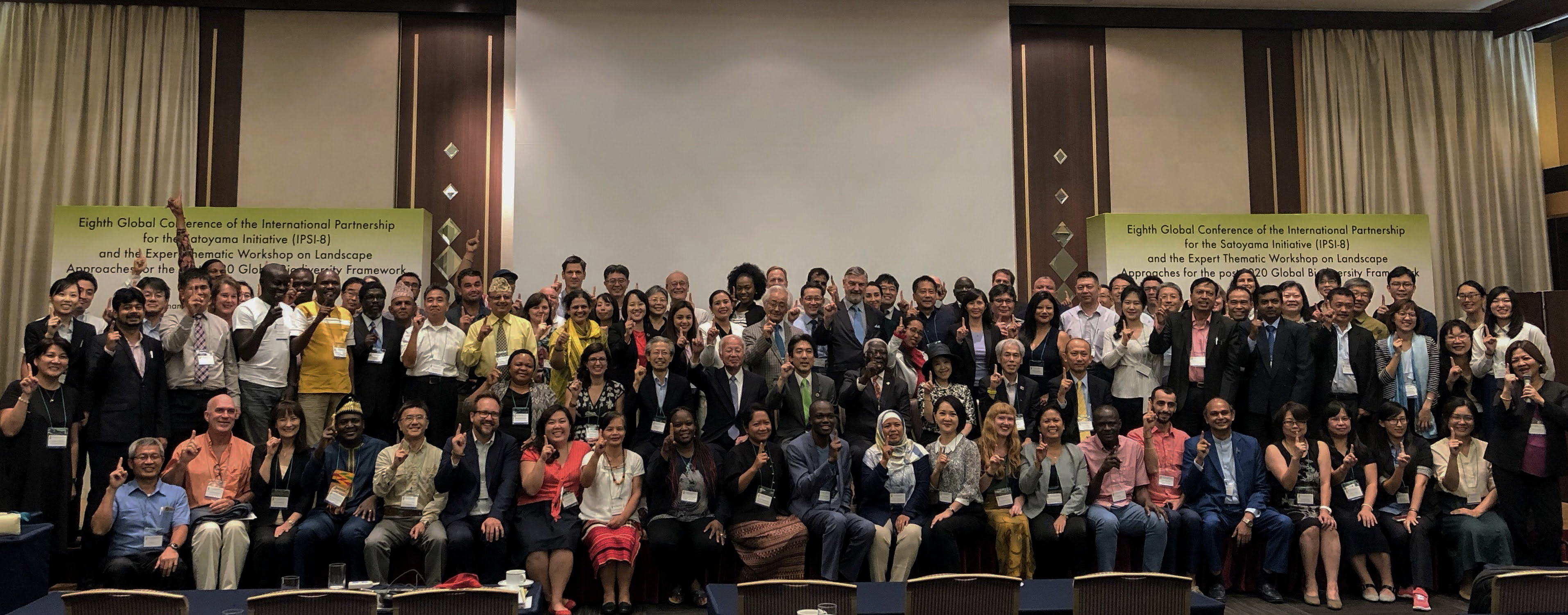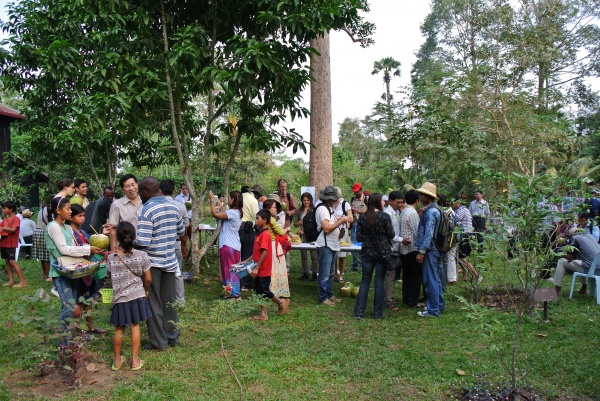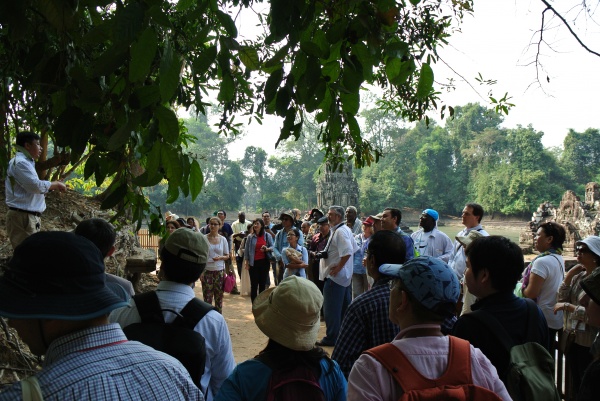The IPSI-6 Summary Report is now available for download here.
The Sixth Global Conference of the International Partnership for the Satoyama Initiative (IPSI-6) was held from 12 to 14 January 2016 at the Empress Angkor Hotel in Siem Reap, Cambodia. The conference was organized by the IPSI Secretariat and hosted by the Ministry of Environment of the Government of the Kingdom of Cambodia, and consisted of a meeting of the IPSI General Assembly and a Public Forum, plus an excursion to nearby sites, a reception, and other opportunities for participants to interact.
The IPSI General Assembly is primarily a forum for information-sharing and decisions regarding the future direction of IPSI, and is open to all IPSI members. Others were welcome to observe the Sixth Meeting. Highlights this time included the welcoming of new IPSI members and the rotation of the membership of the IPSI Steering Committee. The meeting was co-chaired by Prof. Kazuhiko Takeuchi, Senior Vice-Rector of the United Nations University and Mr. Tin Ponlok, Secretary General, General Secretariat for the National Council for Sustainable Development of Cambodia.
The Public Forum is an opportunity for non-members to learn about IPSI and its activities as well as a venue for discussion of various topics related to socio-ecological production landscapes and seascapes (SEPLS), their revitalization and sustainable management. The IPSI-6 Public Forum was held with the theme “Planning and reviewing strategic actions for sustainable landscape and seascape management”, and featured a number of interesting presentations on this theme as well as working-group discussions for IPSI members from around the world and participants.
Opening Session
The Opening Session of IPSI-6 was hosted by the Ministry of Environment of Cambodia, as a chance for the Kingdom of Cambodia to welcome the participants and express their wishes for a successful conference. It was hosted by Ms. Bopreang Ken of the Ministry of Environment, and featured the following statements:
Welcome Remarks:
- H.E. Kim Chhai Hieng (Deputy Provincial Governor of Siem Reap Province)
- Prof. Kazuhiko Takeuchi (Senior Vice-Rector of the United Nations University)
Opening Remarks:
- H.E. Khieu Muth (Secretary of State, Ministry of Environment of the Kingdom of Cambodia)
General Assembly
The Sixth Meeting of the IPSI General Assembly was held from 13:30 to 15:30 on Tuesday, 12 January, 2016. The General Assembly is primarily for information-sharing and decisions regarding the future direction of IPSI, and is open to all IPSI members. This meeting was co-chaired by by Prof. Kazuhiko Takeuchi, Senior Vice-Rector of the United Nations University and Mr. Tin Ponlok, Secretary General, General Secretariat for the National Council for Sustainable Development of Cambodia. Reports from the Chair of the IPSI Steering Committee and the IPSI Secretariat welcomed new members to the partnership and announced the endorsement of new IPSI Collaborative Activities. Also, the General Assembly determined the makeup of the IPSI Steering Committee for its next term.
The agenda of the IPSI-6 General Assembly is available for download here: Agenda of the General Assembly
Public Forum
The Public Forum is open to the general public as well as IPSI members, and was held from 16:00 on Tuesday, 12 January to 17:30 on Wednesday, 13 January 2016. The Public Forum is an opportunity for non-members to learn about IPSI and its activities as well as a venue for discussion of various topics related to socio-ecological production landscapes and seascapes (SEPLS), their revitalization and sustainable management. This time, the meeting was held as a part of the interim review process for the IPSI Plan of Action 2013-2018, with the theme “Planning and reviewing strategic actions for sustainable landscape and seascape management”. It featured a number of interesting presentations on this theme as well as working-group discussions for IPSI members from around the world and participants.
The programme for the IPSI-6 Public Forum is available for download here: Website_Programme
Day 1 Plenary:
The plenary sessions were moderated by Ms. Yoko Watanabe from the Secretariat of the Global Environment Facility and Mr. Jady Smith of Live & Learn Environmental Education, an NGO active in Cambodia. After remarks from the moderators, six presentations were given on activities related to SEPLS in Cambodia:
- Ms. Somaly Chan (Deputy Secretary General of National Council for Sustainable Development, Ministry of Environment of the Kingdom of Cambodia) “Cambodia Context on Satoyama Initiative”
- Prof. Kalemani Jo Mulongoy “National Biodiversity Strategy and Action Plan, a tool for the effective management of protected areas in Cambodia”
- Dr. Peou Hang (APSARA Authority) “Rehabilitation of Angkor Cultural Landscape: Ancient hydraulic system”
- Dr. Jeeranuch Sakkhamduang (Institute of Environmental Rehabilitation and Conservation, ERECON) “Effective cyclic use of natural resources through eri-culture in Kampong Cham Province, Cambodia”
- Ms. Ngin Navirak (United Nations Development Programme, UNDP) “COMDEKS case study/projects in Steung Siem Reap Watershed Landscape”
- Mr. Philippe Delanghe (The United Nations Educational, Scientific and Cultural Organization, UNESCO) “Restoration of archaeological site and its relationship with cultural landscape”
Mr. William Dunbar of the IPSI Secretariat then gave an overview and introduction to the Satoyama Initiative, IPSI and the plan for the rest of IPSI-6: Introduction to Satoyama Initiative and IPSI-6 Public Forum.
Working Groups:
Participants were divided into four working groups, one for each of the Strategic Objectives found in the IPSI Strategy and Plan of Action 2013-2018. Each working group featured a number of presentations from its participants, followed by discussion to identify key messages and lessons learned. These were then presented in the final plenary for further discussion to identify key themes for the conference as a whole.
Group 1: Increase knowledge and understanding of SEPLS.
Facilitators:
- Ms. Hydie Reyes Maspinas (Hydrology for Environment, Life and Policy (HELP) Davao)
- Dr. Maurizio Farhan Ferrari (Forest Peoples Programme)
Presentations:
- Mr. Mangal Man Shakya (Wildlife Watch Group) “Damage of SEPLS in Nepal due to epic earthquake in April-May 2015”
- Prof. Jorge Ramon Malleux (Asociasion Pro Desarroillo Agroindustrial de Camana, APAIC) “Evaluation of the biodiversity chain in barren landscapes ecosystems restored through reforestation with Caesalpinea spinosa, in the southern semiarid coast of Peru”
- Dr. Mimi Urbanc (Research Centre of the Slovenian Academy of Sciences and Arts, ZRC SAZU) “The Common Mountain Pastures in Velika planina”
- Prof. Dayuan Xue (Minzu University of China) “The classification and database for traditional knowledge associated biodiversity in China”
- Mr. Nutdanai Trakansuphakon (Indigenous Knowledge and Peoples, IKAP) “Promoting Karen indigenous Sustainable Rotational Farming and Ecosystem Management for Recognition and Transmit to New Generation”
- Dr. Rashed Al Mahmud Titumir (Unnayan Onneshan) “The SDGs and the Satoyama Initiative: Relevance and Relationships for Transforming Our World Connecting the local, national and international actions”
- Dr. Kuang-Chung Lee (National Dong-Hwa University) “Participatory Identification and Evaluation of Indicators of Resilience in Socio-ecological Production Landscapes: Some Preliminary Findings from an Indigenous Rice Paddy Cultural Landscape in Taiwan”
- Ms. Olga Khimchenko (Environmental Education Centre Zapovedniks) “Environmental education Centre ‘Zapovedniks‘”
- Ms. Maripres Sarinas (University of the Philippines Open University, UPOU) “Overview of the Satoyama Online course of the University of the Philippines Open University”
Group 2: Address the direct and underlying causes responsible for the decline or loss of biological and cultural diversity as well as ecological and socio-economic services from SEPLS.
Facilitators:
- Mr. Atsuhiro Yoshinaka (Secretariat of the Convention on Biological Diversity)
- Ms. Nadia Bergamini (Bioversity International)
Presentations:
- Ms. Nadia Bergamini (Bioversity International) “Landscape certification to enhance biodiversity conservation and livelihood wellbeing”
- Prof. Jinlong Liu (Centre for Forestry, Environmental and Resources Policy Study, Renmin University of China) “Decontextualizing Changes of Traditional Forest-related Knowledge of Lisu Minority in China”
- Ms. Laxmi J. Shrestha and Dr. Mohan Prasad Devkota (Tribhuvan University) “How efficient are sacred landscapes of Kathmandu Valley in biodiversity conservation?”
- Mr. Patrick Kofi Avumegah (Civil Society Organisation Action Ghana) “Modern and Traditional SEPLS management: Sacred groves losing grounds to modernity in Volta”
- Mr. Alejandro Argumedo (Asociacion ANDES) “Biocultural Heritage Territories: learning form indigenous peoples’ cosmologies and practices“
- Mr. Imran Ahimbisibwe (Environmental Protection Information Center, EPIC) “Enhancing Local Communities’ Participation in Restoration of the Degraded Biodiversity in Lake Victoria Ecosystem”
- Mr. Josephat Musili Musyima (Laikipia Wildlife Forum) “Community engagement in natural resource management in Laikipia County”
- Dr. Marcal Gusmao (Ministry of Commerce, Industry and Environment, Timor-Leste) “Climate change vulnerability assessment in Hera and Coastal Line of Pantai Kelapa, Dili, Timor-Leste”
Group 3: Enhance benefits from SEPLS.
Facilitators:
- Mr. Stuart Chape (Secretariat of the Pacific Regional Environment Programme, SPREP)
- Dr. William Olupot (Nature and Livelihoods)
Presentations:
- Mr. Stuart Chape (Secretariat of the Pacific Regional Environment Programme, SPREP) “Integrated Landscape Approaches to Ecosystem-based Adaptation to Climate Change in the Pacific Islands Region”
- Dr. William Olupot (Nature and Livelihoods) “Results from the SDM-funded project on developing high value market products from indigenous wild fruits”
- Dr. Bishnu Hari Pandit (Kathmandu Forestry College, KAFCOL) “Agroforestation with biochar for carbon capture and increased agriculture productivity in middle hills of Nepal”
- Ms. Uma Khumairoh (Organic Farming Systems Research Centre, IORC) “Re-designing rice systems to restore ecosystem services through complex rice agro-ecosystems”
- Mr. Jayant Prabhakar Sarnaik (Applied Environmental Research Foundation, AERF) “FAIRWILD certification- an enabling framework for building capacity of local communities, implementation of ABS and truly sustainable livelihoods”
- Mr. Seth Ken Appiah-Kubi (A Rocha Ghana) “Opportunities for certification and branding of products from SEPLS”
- Prof. Ning Wu (International Centre for Integrated Mountain Development) “Conserving biological and cultural diversity and sustaining ecosystem services in transboundary landscapes of the Hindu Kush Himalayan region”
- Mr. Gideon Galiwango Bukko (Civil Society Organizations’ Network for Sustainable Agriculture and Environment in East Africa, CISONET) “The extent of how forests have been destructed in East Africa: a case study of Uganda”
Group 4: Enhance the human, institutional and sustainable financial capacities for the implementation of the Satoyama Initiative.
Facilitators:
- Dr. Anil Kumar Nadesa Panicker (M. S. Swaminathan Research Foundation)
- Dr. Yoji Natori (Conservation International Japan)
Presentations:
- Mr. Gerald Jelod Jetony (Natural Resources Office, Sabah, Malaysia) “Sustainable Fishery Resources Management”
- Dr. Yoji Natori (Conservation International) “The GEF-Satoyama Project: from site-based to global impact”
- Ms. Yoko Watanabe (Global Environment Facility Secretariat, GEF SEC) “Financing Mainstreaming Biodiversity in Production Landscapes and Seascapes”
- Mr. Ngwang Sonam Sherpa (Nepal Indigenous Nationalities Preservation Association, NINPA) “International synergy to implement Satoyama Initiatives”
- Mr. Achille Orphée Lokossou (NGO CeSaReN) “Valorisation of genetic resources (GR) and associated traditional knowledge (ATK) for the sustainable management of sacred forest (SF) in Benin”
- Dr. Olivier Hamerlynck (Kenya Wetlands Biodiversity Research Team, KENWEB) “Threats to and opportunities for traditional production landscapes in African wetlands”
- Dr. Anil Kumar Nadesa Panicker (M S Swaminathan Research Foundation) “Agro-biodiversity & SEPL based Climate Change Adaptation”
Day 2 Plenary:
Participants from the working groups gathered again in plenary for the afternoon of 13 January. After an introduction by the moderators, representatives from each working group took the stage to give a presentation summarizing the outcomes of their group’s discussion:
- Group 1: Increase knowledge and understanding of SEPLS.
- Group 2: Address the direct and underlying causes responsible for the decline or loss of biological and cultural diversity as well as ecological and socio-economic services from SEPLS.
- Group 3: Enhance benefits from SEPLS.
- Group 4: Enhance the human, institutional and sustainable financial capacities for the implementation of the Satoyama Initiative.
Each of these presentations was followed by additional information from the IPSI Secretariat on the ongoing process of the interim review of the Plan of Action. The Secretariat had sent a questionnaire to all IPSI members on their use and opinion of the Plan of Action, and results from the initial analysis of the questionnaires was presented by the Secretariat’s Ms. Caecilia Manago. Both the questionnaires and the discussions held at IPSI-6 were vital data for the interim review process, due to be finished in the near future after the conference.
Finally, a wrap-up discussion was led by the moderators, who then gave their final remarks, noting the importance of information-sharing within the partnership, in addition to a “flat”, inclusive approach while maintaining a holistic perspective. It was pointed out that a lot has been learned so far in the five years since the launching of IPSI, while the Plan of Action has facilitated a wide variety of actions by partners. The moderators finally expressed their hope that synergies between members will continue and increase, and that synergies can also be found with other initiatives including those on the UN’s Sustainable Development Goals (SDGs) and climate change.
Excursion
An excursion to several sites around Siem Reap and the Angkor Wat complex was organized for participants by the Ministry of Environment of Cambodia.
Participants first observed human and natural resource use interactions at Srah Srang Village and its Khmer Habitat Centre, seeing some of the local production activities including those related to the area’s main industry, tourism. They then had a chance to sample some of the local delicacies produced sustainably from local products and with zero plastic garbage.
Next, participants visited Neak Pon and Preah Kahn to learn about the ancient and modern role of water in the landscape. The large reservoir that had been drained is now being refilled as part of the water-management strategy by the APSARA Authority, both to protect the landscape and to provide water for the growing city of Siem Reap.
Lastly, visits were organized to the temples of Bayon and Angkor Wat to show the cultural heritage of the monuments, which are now the main tourism attractions in the area and a major source of income.
For inquiries about IPSI-6, please contact the IPSI Secretariat.







